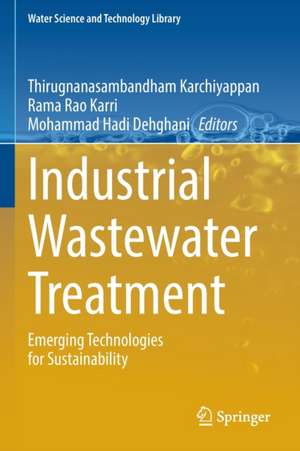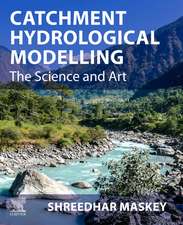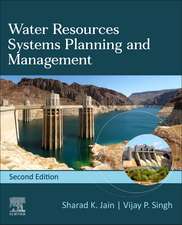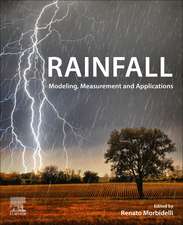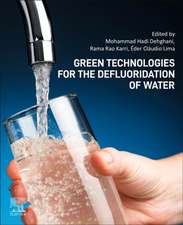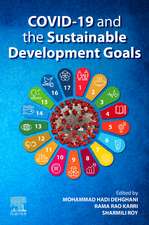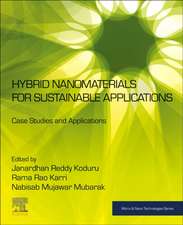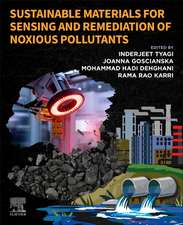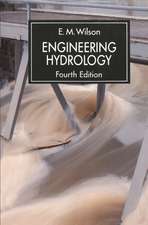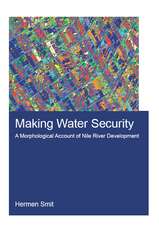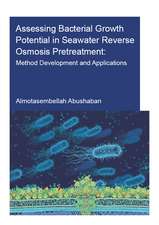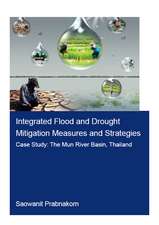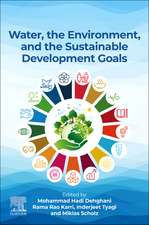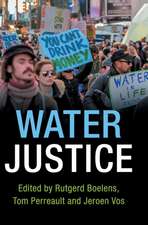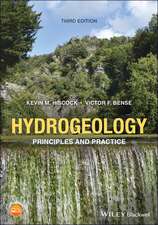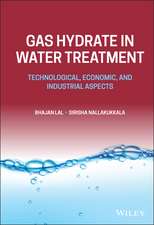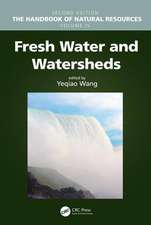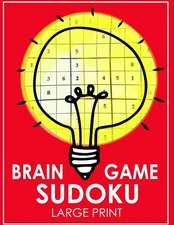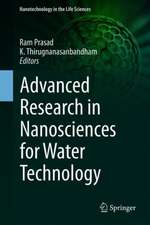Industrial Wastewater Treatment: Emerging Technologies for Sustainability: Water Science and Technology Library, cartea 106
Editat de Thirugnanasambandham Karchiyappan, Rama Rao Karri, Mohammad Hadi Dehghanien Limba Engleză Paperback – 23 apr 2023
- The book presents the negative impact of inorganic and organic pollutants on the natural environment and human health.
- It describes and discussing the advanced membrane technologies, novel green adsorbents, microbial treatment techniques, electro chemical and solar based removal techniques
- It also compares the most effective methods of removing toxic contaminants from water solutions with the use of sustainable and energy efficient approaches
- It also presents the life cycle assessment of emerging technologies in industrial wastewater treatment and desalination as well as presents the benchmarking of energy efficiency during treatment process
| Toate formatele și edițiile | Preț | Express |
|---|---|---|
| Paperback (1) | 953.35 lei 43-57 zile | |
| Springer International Publishing – 23 apr 2023 | 953.35 lei 43-57 zile | |
| Hardback (1) | 959.50 lei 43-57 zile | |
| Springer International Publishing – 23 apr 2022 | 959.50 lei 43-57 zile |
Din seria Water Science and Technology Library
- 18%
 Preț: 950.96 lei
Preț: 950.96 lei - 15%
 Preț: 646.62 lei
Preț: 646.62 lei - 24%
 Preț: 796.92 lei
Preț: 796.92 lei - 18%
 Preț: 892.90 lei
Preț: 892.90 lei - 18%
 Preț: 953.65 lei
Preț: 953.65 lei -
 Preț: 459.43 lei
Preț: 459.43 lei - 18%
 Preț: 742.31 lei
Preț: 742.31 lei - 18%
 Preț: 1226.11 lei
Preț: 1226.11 lei - 18%
 Preț: 956.50 lei
Preț: 956.50 lei - 18%
 Preț: 1225.48 lei
Preț: 1225.48 lei - 18%
 Preț: 776.40 lei
Preț: 776.40 lei - 18%
 Preț: 1014.76 lei
Preț: 1014.76 lei - 18%
 Preț: 957.13 lei
Preț: 957.13 lei - 24%
 Preț: 744.68 lei
Preț: 744.68 lei - 18%
 Preț: 1108.04 lei
Preț: 1108.04 lei - 18%
 Preț: 1121.65 lei
Preț: 1121.65 lei - 15%
 Preț: 644.63 lei
Preț: 644.63 lei - 18%
 Preț: 1116.71 lei
Preț: 1116.71 lei - 18%
 Preț: 731.91 lei
Preț: 731.91 lei - 24%
 Preț: 744.33 lei
Preț: 744.33 lei - 18%
 Preț: 894.46 lei
Preț: 894.46 lei - 18%
 Preț: 1020.74 lei
Preț: 1020.74 lei - 24%
 Preț: 945.42 lei
Preț: 945.42 lei -
 Preț: 553.51 lei
Preț: 553.51 lei - 24%
 Preț: 840.38 lei
Preț: 840.38 lei
Preț: 953.35 lei
Preț vechi: 1162.61 lei
-18% Nou
Puncte Express: 1430
Preț estimativ în valută:
182.45€ • 189.77$ • 150.62£
182.45€ • 189.77$ • 150.62£
Carte tipărită la comandă
Livrare economică 14-28 aprilie
Preluare comenzi: 021 569.72.76
Specificații
ISBN-13: 9783030982041
ISBN-10: 3030982041
Pagini: 475
Ilustrații: VIII, 475 p. 97 illus., 72 illus. in color.
Dimensiuni: 155 x 235 mm
Greutate: 0.67 kg
Ediția:1st ed. 2022
Editura: Springer International Publishing
Colecția Springer
Seria Water Science and Technology Library
Locul publicării:Cham, Switzerland
ISBN-10: 3030982041
Pagini: 475
Ilustrații: VIII, 475 p. 97 illus., 72 illus. in color.
Dimensiuni: 155 x 235 mm
Greutate: 0.67 kg
Ediția:1st ed. 2022
Editura: Springer International Publishing
Colecția Springer
Seria Water Science and Technology Library
Locul publicării:Cham, Switzerland
Cuprins
Recent Developments in Membrane Filtration for Wastewater Treatment.- Ultrafiltration membrane water treatment system: An overview.- Ultrafiltration Integrated Photocatalytic Membrane Systems in Water and Wastewater Treatment: An Overview.- Application of electrospun polymeric nanofibrous membranes for water treatment.- Biosorbents in industrial wastewater treatment.- Nanoparticles in industrial wastewater treatment: An overview.
Notă biografică
Dr. Thirugnanasambandham Karchiyappan completed PhD (Environmental Chemistry-Water purification) in Anna University, India. After that, he has worked as a Post-Doctoral Fellow in state university of Maringa (CAPES Postdoctoral Fellowship), Brazil; Sun Yat Sen University (NSF Postdoctoral Fellowship), China and Dublin City University (Marie Curie Postdoctoral Fellowship), Ireland. Now, he is presently working as Post-Doctoral Fellow in department of molecular engineering, Lodz university of Technology, Lodz, Poland in Ulam NAWA project (PPN/ULM/2020/1/00017/U/00001/A/00001). Also, he is presently working as an Assistant Professor in chemistry department (Excel College of Engineering and Technology, Tamil Nadu, India) for an about 8 months. During his PhD, he has been worked in University Grants Commission (UGC)-Major Research Project. He published more than 25 international journals includes Q1 Journal. Also, he visited various countries like United Kingdom, Italy and Denmarkfor career development..
Dr. Rama Rao Karri working as Associate professor in Petroleum and chemical engineering, Faculty of Engineering, Universiti Teknologi Brunei (UTB), Brunei Darussalam. He has obtained his PhD in Chemical Engineering from Indian Institute of Technology (IIT) Delhi, Masters from IIT Kanpur, and Bachelors from Andhra University College of Engineering, Visakhapatnam. He has worked as a Post-Doctoral research fellow at NUS, Singapore for about six years and has over 18 years of working experience in Academics, Industry, and Research. He has led the water resources cluster team at UTB (2015-2017) which has focused on Water-Energy Nexus, Smart Water and Environmental Management. His research activities are mainly focused in the development of modelling methods for systems with inherent uncertainties in multidisciplinary fields. He has experience of working in multidisciplinary fields and has expertise in various evolutionary optimization techniques and process modeling. He has published around 55 research articles in reputed journals with a combined Impact factor of 160.8 and has an h-index of 18 (Scopus and Google Scholar). He also contributed 9 book chapters published in Elsevier & Springer journals. He is an editorial board member in 6 renowned journals and peer-review member for more than 69 reputed journals from Elsevier (23), Springer (15), Taylor & Francis (9), Scientific Reports, other reputed journals (24) and peer reviewed more than 240 manuscripts. Recipient of Publons Peer Reviewer Award as top 1% of global peer reviewers for Environment & Ecology and Crossfield categories for the year 2019. He is also delegating as advisory board member for many International conferences. He is presently holding a position as Editor-in-Chief in International Journal of Chemoinformatics and Chemical Engineering, IGI Global, USA. He is also a Managing Guest editor for Spl. Issue: “Magnetic nano composites and emerging applications", in Journal of Environmental Chemical Engineering (IF: 4.30), Elsevier. Also, been a Guest editor for Spl. Issue: “Nanocomposites for the Sustainable Environment”, in Applied Sciences Journal (IF: 2.474), MDPI. He is also Associate editor in International Journal of Energy and Water Resources (IJEWR), Springer Inc. He along with his mentor, Prof. Venkateswarlu is authoring an Elsevier book, “Optimal state estimation for process monitoring, diagnosis and control”. He is also co-editor and managing editor for 5 ongoing Elsevier edited books: 1) Sustainable Nanotechnology for Environmental Remediation 2) Soft computing techniques in solid waste and wastewater management 3) Green technologies for de-fluoridation of water using adsorption processes and Nano-adsorbents. 4) Overview of pesticides remediation from water bodies - Methods and treatment techniques 5) Environmental and Health Management of Novel Coronavirus Disease (COVID-19).
Prof. Dr Mohammad Hadi Dehghani is a Full Professor at the Tehran University of Medical Sciences (TUMS), School of Public Health, Department of Environmental Health Engineering, Tehran, Iran, Islamic Republic Of. His scientific research interests include the Environmental Science. He is the author of various research studies published at national and international journals, conference proceedings and Head of several research projects at the TUMS. He has authored 12 books and more than 200 full papers published in peer-reviewed journals. He is an editorial board member, Guest editor and reviewer in many internal and international journals and is member of several international science committees around the world. He is supervisor and advisor for many PhD and MSc theses at the TUMS. He is currently also a member of the Iranian Association of Environmental Health (IAEH) andmember of the Institute for Environmental Research (IER) at the TUMS. He is co-editor for 4 Elsevier edited books:1) Soft computing techniques in solid waste and wastewater management, 2) Environmental and health management of novel coronavirus disease (COVID-19), 3) Pesticide’s remediation technologies from water and wastewater, 4) Sustainable materials for sensing and remediation of noxious pollutants.
Dr. Rama Rao Karri working as Associate professor in Petroleum and chemical engineering, Faculty of Engineering, Universiti Teknologi Brunei (UTB), Brunei Darussalam. He has obtained his PhD in Chemical Engineering from Indian Institute of Technology (IIT) Delhi, Masters from IIT Kanpur, and Bachelors from Andhra University College of Engineering, Visakhapatnam. He has worked as a Post-Doctoral research fellow at NUS, Singapore for about six years and has over 18 years of working experience in Academics, Industry, and Research. He has led the water resources cluster team at UTB (2015-2017) which has focused on Water-Energy Nexus, Smart Water and Environmental Management. His research activities are mainly focused in the development of modelling methods for systems with inherent uncertainties in multidisciplinary fields. He has experience of working in multidisciplinary fields and has expertise in various evolutionary optimization techniques and process modeling. He has published around 55 research articles in reputed journals with a combined Impact factor of 160.8 and has an h-index of 18 (Scopus and Google Scholar). He also contributed 9 book chapters published in Elsevier & Springer journals. He is an editorial board member in 6 renowned journals and peer-review member for more than 69 reputed journals from Elsevier (23), Springer (15), Taylor & Francis (9), Scientific Reports, other reputed journals (24) and peer reviewed more than 240 manuscripts. Recipient of Publons Peer Reviewer Award as top 1% of global peer reviewers for Environment & Ecology and Crossfield categories for the year 2019. He is also delegating as advisory board member for many International conferences. He is presently holding a position as Editor-in-Chief in International Journal of Chemoinformatics and Chemical Engineering, IGI Global, USA. He is also a Managing Guest editor for Spl. Issue: “Magnetic nano composites and emerging applications", in Journal of Environmental Chemical Engineering (IF: 4.30), Elsevier. Also, been a Guest editor for Spl. Issue: “Nanocomposites for the Sustainable Environment”, in Applied Sciences Journal (IF: 2.474), MDPI. He is also Associate editor in International Journal of Energy and Water Resources (IJEWR), Springer Inc. He along with his mentor, Prof. Venkateswarlu is authoring an Elsevier book, “Optimal state estimation for process monitoring, diagnosis and control”. He is also co-editor and managing editor for 5 ongoing Elsevier edited books: 1) Sustainable Nanotechnology for Environmental Remediation 2) Soft computing techniques in solid waste and wastewater management 3) Green technologies for de-fluoridation of water using adsorption processes and Nano-adsorbents. 4) Overview of pesticides remediation from water bodies - Methods and treatment techniques 5) Environmental and Health Management of Novel Coronavirus Disease (COVID-19).
Prof. Dr Mohammad Hadi Dehghani is a Full Professor at the Tehran University of Medical Sciences (TUMS), School of Public Health, Department of Environmental Health Engineering, Tehran, Iran, Islamic Republic Of. His scientific research interests include the Environmental Science. He is the author of various research studies published at national and international journals, conference proceedings and Head of several research projects at the TUMS. He has authored 12 books and more than 200 full papers published in peer-reviewed journals. He is an editorial board member, Guest editor and reviewer in many internal and international journals and is member of several international science committees around the world. He is supervisor and advisor for many PhD and MSc theses at the TUMS. He is currently also a member of the Iranian Association of Environmental Health (IAEH) andmember of the Institute for Environmental Research (IER) at the TUMS. He is co-editor for 4 Elsevier edited books:1) Soft computing techniques in solid waste and wastewater management, 2) Environmental and health management of novel coronavirus disease (COVID-19), 3) Pesticide’s remediation technologies from water and wastewater, 4) Sustainable materials for sensing and remediation of noxious pollutants.
Textul de pe ultima copertă
This book provides an overview of recent advances in technologies for water treatment processes, such as green technology, nano-adsorbents, photocatalysts, advanced oxidation, membranes separation and sustainable technologies. Advances in membrane technology and fabrication process is presented in detail. Latest approaches like microbial treatment, electro chemical and solar energy-based treatment techniques were presented. Also, the use of sustainable and energy efficient approaches were discussed.
- The book presents the negative impact of inorganic and organic pollutants on the natural environment and human health.
- It describes and discussing the advanced membrane technologies, novel green adsorbents, microbial treatment techniques, electro chemical and solar based removal techniques
- It also compares the most effective methods of removing toxic contaminants from water solutions with the use of sustainable and energy efficient approaches
- It also presents the life cycle assessment of emerging technologies in industrial wastewater treatment and desalination as well as presents the benchmarking of energy efficiency during treatment process.
Caracteristici
Provides an overview of recent advances in technologies Plays an important role in the development of strategies Reinforces water savings, which are important in areas with limited rainfall
